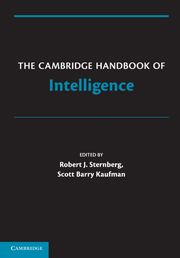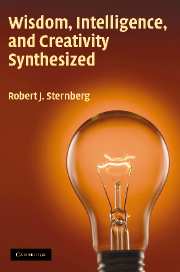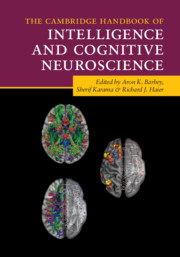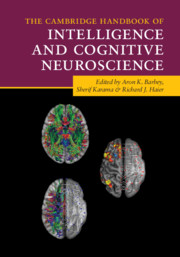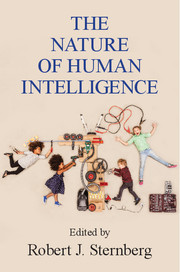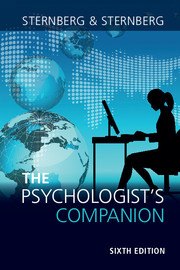The Cambridge Handbook of Intelligence
This volume provides the most comprehensive and up-to-date compendium of theory and research in the field of human intelligence. Each of the 42 chapters is written by world-renowned experts in their respective fields, and, collectively, they cover the full range of topics of contemporary interest in the study of intelligence. The handbook is divided into nine parts: Part I covers intelligence and its measurement; Part II deals with the development of intelligence; Part III discusses intelligence and group differences; Part IV concerns the biology of intelligence; Part V is about intelligence and information processing; Part VI discusses different kinds of intelligence; Part VII covers intelligence and society; Part VIII concerns intelligence in relation to allied constructs; and Part IX is the concluding chapter, which reflects on where the field is currently and where it still needs to go.
- Uniquely comprehensive, covering the entire field of human intelligence
- Totally up to date, including the latest theory and research
- Written by the leading experts in the field
Reviews & endorsements
“Sternberg and Kaufman have assembled nearly all of the foremost intelligence researchers and theorists to produce an absolutely essential volume for anyone who wants to understand the nature – and nurture – of intelligence in its many forms. It is the most thorough, authoritative, and readable sourcebook on the science of intelligence that I have ever seen.”
– Joshua Aronson, New York University, editor of Improving Academic Achievement
“The Cambridge Handbook of Intelligence is an extraordinary achievement. Comprehensive, engaging, inspiring, and at times provocative, it leaves no stone unturned – no aspects of intelligence and its consequences unexplored. What is intelligence? Where does it come from? Can it be developed, and if so, how? If you are looking for answers to questions like these, there is no better place to find them than from the world-renowned experts in this remarkable volume.”
– Heidi Grant Halvorson, psychologist, author of Succeed: How We Can Reach Our Goals
"...Sternberg and Kaufman brought together a group of scholars and theorists with the expertise and knowledge to compile an important contribution to the field of intelligence studies. This volume consolidates decades of research and theory into an accessible volume.... well-organized and coherent.... offer an excellent resource.... This book would be an excellent addition to the collection of any scholar with an interest in intelligence and a must have for new scholars in the field. I will be recommending this text to our university library so that it may be a resource for my colleagues and our graduate students."
– Professor Christopher A. Was, Kent State University, PsycCRITIQUES
Product details
June 2011Adobe eBook Reader
9781139089012
0 pages
0kg
46 b/w illus. 19 tables
This ISBN is for an eBook version which is distributed on our behalf by a third party.
Table of Contents
- Part I. Intelligence and Its Measurement:
- 1. History of theories and measurement of intelligence N. J. Mackintosh
- 2. Tests of intelligence Susana Urbina
- 3. Factor-analytic models of intelligence John O. Willis, Ron Dumont and Alan S. Kaufman
- 4. Contemporary models of intelligence Janet E. Davidson and Iris A. Kemp
- Part II. Development of Intelligence:
- 5. Intelligence: genes, environments, and their interactions Samuel D. Mandelman and Elena L. Grigorenko
- 6. Developing intelligence through instruction Raymond S. Nickerson
- 7. Intelligence in infancy Joseph F. Fagan
- 8. Intelligence in childhood L. Todd Rose and Kurt Fischer
- 9. Intelligence in adulthood Christopher Hertzog
- Part III. Intelligence and Group Differences:
- 10. Intellectual disabilities Robert M. Hodapp, Megan M. Griffin, Meghan M. Burke and Marisa H. Fisher
- 11. Prodigies and savants David Henry Feldman and Martha J. Morelock
- 12. Intellectual giftedness Sally M. Reis and Joseph S. Renzulli
- 13. Sex differences in intelligence Diane F. Halpern, Anna S. Beninger and Carli A. Straight
- 14. Racial and ethnic group differences in intelligence in the United States: multicultural perspectives Lisa A. Suzuki, Ellen L. Short and Christina S. Lee
- 15. Race and intelligence Christine E. Daley and Anthony J. Onwuegbuzie
- Part IV. Biology of Intelligence:
- 16. Animal intelligence Thomas R. Zentall
- 17. The evolution of intelligence Liane Gabora and Anne Russon
- 18. Biological bases of intelligence Richard J. Haier
- Part V. Intelligence and Information Processing:
- 19. Basic processes of intelligence Ted Nettelbeck
- 20. Working memory and intelligence Andrew R. A. Conway, Sarah Getz, Brooke Macnamara and Pascale M. J. Engel de Abreu
- 21. Intelligence and reasoning David F. Lohman and Joni M. Lakin
- 22. Intelligence and rationality Keith E. Stanovich, Richard F. West and Maggie E. Toplak
- 23. Intelligence and the cognitive unconscious Scott Barry Kaufman
- 24. Artificial intelligence Ashok K. Goel and Jim Davies
- Part VI. Kinds of Intelligence:
- 25. The theory of multiple intelligences Katie Davis, Joanna Christodoulou, Scott Seider and Howard Gardner
- 26. The theory of successful intelligence Robert J. Sternberg
- 27. Emotional intelligence John D. Mayer, Peter Salovey, David Caruso and Lillia Cherkasskiy
- 28. Practical intelligence Richard K. Wagner
- 29. Social intelligence John F. Kihlstrom and Nancy Cantor
- 30. Cultural intelligence Soon Ang, Linn Van Dyne and Mei Ling Tan
- 31. Mating intelligence Glenn Geher and Scott Barry Kaufman
- Part VII. Intelligence and Society:
- 32. Intelligence in worldwide perspective Weihua Niu and Jillian Brass
- 33. Secular changes in intelligence James R. Flynn
- 34. Society and intelligence Susan M. Barnett, Heiner Rindermann, Wendy M. Williams and Stephen J. Ceci
- 35. Intelligence as a predictor of health, illness, and death Ian J. Deary and G. David Batty
- Part VIII. Intelligence in Relation to Allied Constructs:
- 36. Intelligence and personality Colin DeYoung
- 37. Intelligence and achievement Richard E. Mayer
- 38. Intelligence and motivation Priyanka B. Carr and Carol S. Dweck
- 39. Intelligence and creativity James C. Kaufman and Jonathan A. Plucker
- 40. Intelligence and wisdom Ursula M. Staudin and Judith Glück
- 41. Intelligence and expertise Phillip L. Ackerman
- Part IX. Moving Forward:
- 42. Where are we? Where are we going? Reflections on the current and future states of research on intelligence Earl Hunt.

